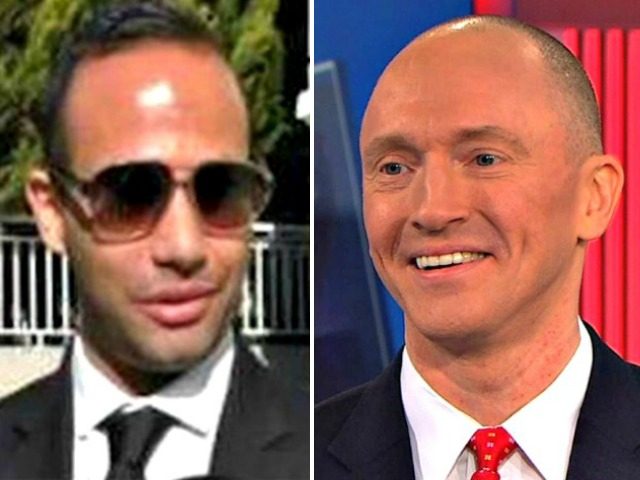Stefan Halper — a potential FBI informant on the Trump campaign — met a number of times with multiple members of the Trump campaign, according to a new report that casts further suspicion on his motives.
Halper — a Cambridge University professor who has ties with the CIA and British intelligence — started a friendship with former Trump campaign adviser Carter Page after he was named as a member of the campaign in March 2016.
Their friendship lasted throughout the time Page was being secretly surveilled by the FBI, according to the report by the Daily Caller’s Chuck Ross.
Page was invited to a U.S. election-related symposium in June 2016 by a student. The symposium took place days after Page returned from a speaking engagement in Moscow on July 8, 2016 that the FBI was tracking.
Halper and Page spoke on the sidelines of the symposium, the report said. Page told the Daily Caller that he recalls nothing of substance being discussed, other than a passing mention by Halper that he knew then-campaign chairman Paul Manafort.
(Incidentally, the Trump dossier put together by former British spy Christopher Steele mentioned Page in his memos on July 19, 2016, which claimed he spoke with two Russian officials. Page has denied ever meeting those two officials).
The FBI would use the dossier’s allegations about Page colluding with Russia to obtain a wiretap on him on October 21, 2016. The Hillary Clinton campaign and the Democratic National Committee had funded the dossier and Steele’s efforts, but the FBI did not tell that to the court granting the warrant.
Halper and Page would meet a “number” of times, including at Halper’s farm in Virginia. They coincidentally “fell out of contact” in September 2017 — around the same time the FBI’s wiretap on Page expired, according to the report.
Halper did not end his contacts with the Trump campaign there.
He also sought out another Trump campaign adviser, George Papadopoulos, who the FBI would later claim sparked its investigation of the Trump campaign.
Halper reached out to Papadopoulos on September 2, 2016, as first reported by the Daily Caller. Halper offered to fly him to London for several nights to discuss him writing a policy paper about energy issues. The young adviser accepted the offer and flew to London.
Papadopoulos and Halper met several times. Halper brought an assistant, a young Turkish woman named “Azra Turk.” Turk would later flirt with Papadopoulos during the encounters and via email, according to the report.
Papadopoulos wrote the paper, and was paid $3,000. Several days before the payment, Halper finalized a contract with the Pentagon’s think tank Office of Net Assessment. He has been paid $928,000 since 2012 for four policy projects for the Pentagon.
During one of his meetings with Papadopoulos, Halper brought up Russians and emails, sparking suspicion.
Papadopoulos was told in May 2016 by a Maltese professor named Joseph Mifsud that the Russians had stolen emails embarrassing to Clinton. Two weeks later, Australian diplomat Alexander Downer requested a meeting with Papadopoulos.
Several days before Halper contacted Papadopoulos, he also contacted and met with a third Trump campaign official, according to Ross. Halper had expressed wanting to help the campaign.
The outreach to Trump campaign officials is all the more odd given that Halper explicitly endorsed Clinton for president six days before the election, according to a Sputnik article.
Attention to Halper has spiked after the Washington Post last week reported that the FBI had a “top secret intelligence source” that had worked with the FBI on the Russian investigation. The report came just before House Intelligence Committee Chairman Devin Nunes (R-CA) received information about the source.
Earlier this week, the New York Times revealed that the FBI had “at least one government informant” that “met several times with Mr. Page and Mr. Papadopoulos.”
Halper, 73, is a veteran of the Nixon, Ford, and Reagan administrations. His late father-in-law was Ray Cline, who served in the CIA’s Bureau of Intelligence and Research. He also worked with a team of former CIA officers on President George H.W. Bush’s unsuccessful 1980 presidential primary bid, and led a team of former CIA analysts who kept tabs on the Jimmy Carter campaign, as noted by the Daily Caller.
Halper also worked closely at Cambridge with a former head of British intelligence, Sir Richard Dearlove, and has directed a non-profit intelligence consulting group that lists UK and U.S. government agencies among its clients, Ross reported.
In December 2016, both Halper and Dearlove threatened to resign from the Cambridge Intelligence Seminar because of what Halper said was “unacceptable Russian influence on the group,” Ross reported.

COMMENTS
Please let us know if you're having issues with commenting.